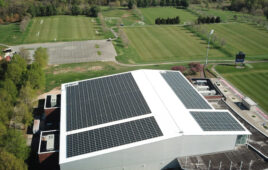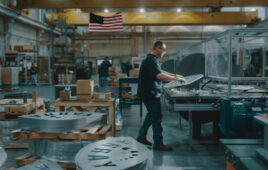The Department of Commerce (Commerce) announced its affirmative final determinations in the antidumping duty and countervailing duty investigations of imports of solar cells from China. Solar cells are produced from ultra-refined polysilicon and are the building blocks of solar photovoltaic power-generation systems, which convert the energy of sunlight directly into electricity.
Commerce determined that Chinese producers/exporters have sold solar cells in the United States at dumping margins ranging from 18.32% to 249.96%. Commerce also determined that Chinese producers/exporters have received countervailable subsidies of 14.78% to 15.97%.
UPDATE: 6:04 p.m. ET (Steven Bushong):
Rhone Resch, president and CEO of the Solar Energy Industries Association (SEIA), today commented on the U.S. Department of Commerce’s antidumping and countervailing duty determinations in the final phase investigation of solar products from China:
“As the end of these investigations near, it’s not too soon to take stock of what has been achieved, consider whether opportunities were missed, and, most importantly, start thinking about how to move forward.
“While today’s decision rightly shows that the U.S. will protect its rights in the global trading system, trade litigation alone is not enough to solve the complex challenges that exist between the U.S. and China. What is immediately clear is that for solar to thrive globally, there is a need to build consensus on acceptable forms of government support for industry.
“Prior to these trade cases, the U.S. and Chinese solar industries enjoyed a strong, productive working relationship. For both sides to succeed going forward, we must return to our collaborative roots at both the industry and government levels.
“Indeed, this collaborative spirit is alive and well elsewhere in the global renewable energy industry. This week, SEIA, other trade groups, and multinational companies joined forces to call for mutually-beneficial, long-term trade solutions through the World Economic Forum’s Green Growth Action Alliance.
“If the opposing parties come to the table, even at this late date, and work together to help grow this global industry, the possibilities are endless.”
UPDATE: 9:33 p.m. ET (Frank Andorka):
Gordon Brinser, SolarWorld Americas president, issued the following statement:
“SolarWorld and Coalition for American Solar Manufacturing (CASM) have fought only to give the solar-pioneering domestic industry a fair chance to continue to compete by removing China’s trade distortions from the U.S. market. Only fair competition can provide sustainable gains in technological efficiency, cost reduction and end-user pricing. Commerce’s decision raises the industry’s chances of reclaiming equal footing for domestic, sustainable and environmentally sound solar-technology producers and their jobs.”
UPDATE: 9:47 p.m. ET (Frank Andorka):
White & Case International Trade Attorney Scott Lincicome, author of a new Cato Institute paper on U.S. subsidy and CVD policy, released the following statment:
“Commerce’s announcement will likely raise already-high tensions between the U.S. and China over subsidies and trade in green goods. It will inevitably lead to a rhetorical rebuke from Beijing and a reminder that China is challenging US anti-subsidy policy at the World Trade Organization and in US courts. But it also could lead to a more forceful response from China in the form of a new trade remedies investigation or a WTO dispute against US green subsidies. Any such response, combined with the ongoing Chinese investigation of US polysilicon and the US investigation of Chinese wind towers, will ensure that bilateral tensions and global uncertainty regarding green energy subsidies will continue for the foreseeable future.”
UPDATE: 10:33 a.m. ET (Frank Andorka):
Jigar Shah, president of the Coalition for Affordable Solar Energy, the group that opposed SolarWorld’s complaint, had this to say about the U.S. Department of Commerce’s decision:
“We are gratified that the scope of today’s decision is limited only to solar cells made in China and that the Department did not significantly increase the tariff from its preliminary decision in May. We are hopeful that continued innovations in technology, a competitive global marketplace and demand-generated pressure for lower prices will take precedence moving forward. At the same time, we remain concerned about the growing global trade war, which will only hurt American solar industry jobs, growth and consumers.
“We believe that global competition is good for American solar consumers and companies. Fortunately, these tariffs will not stop the development of American solar energy, which 92 percent of the American people want to see developed even more, according to a recent national poll. On behalf of 97% to 98% of the US solar industry that fought against SolarWorld, we are all looking forward to ending this distraction and returning to our everyday focus of creating jobs and lowering renewable energy costs.”




Subsidies from any government hurt international trade between countries. The USA is a glowing example of how these subsidies damage trade between countries. For the US to complain about China trading and increase tariffs on China goods yet continue to give subsidies to thier own companies shows they are simply trying give thier own domestic producers unfair advantage. Time to clean the slate or become more competitive. That the China government gives incentives to thier producers shows the world that China is serious about developing alternative energy technology world wide. Two thumbs up for China !!
I agree that the US needs to do more to make our own domestic manufacturers more competitive in the global market, but realistically, there’s only so much you can do. Chinese laborers are working for what we’d consider slave wages which drastically reduces the price floor on their goods. Until we start running sweat shops of our own, or making significant enough tech breakthroughs to offset the higher labor costs in the US, we’ll never be able to compete on pricing head-to-head with the Chinese. Oh, and we’ll also need some serious patent reform here in the US while we’re at it. The current system is too stifling to allow for rapid development, cost reduction, and deployment of new technology. We spent too much time and money in making licensing deals or on litigation when those deals aren’t made properly.
We say we want to go green, but clearly, we aren’t putting our money where our mouths are. Of course, solar adoption is going to slow down to a rate lower than we’d like when we finally get some low-cost equipment available, but then tax/tariff the hell out of it. There’s little incentive for power companies to install it when it costs significantly more $/Watt to produce solar power compared to coal or natural gas. The only incentive they have is for marketing reasons and to be in compliance with the state mandates to have X% of their power from renewable energy. Marketing advantage isn’t much of an advantage at all since these companies have monopolies in most markets they operate in, so they don’t have to compete to win business.
The only way this is ever going to take off in a major way is for us to drive the installation costs down, not up through taxation. Tariffs on the panels themselves protects domestic manufacturers from dumping, yes, I agree here. But it also has the effect of depressing the entire market at the same time. It increases the overall cost of deploying a solar farm, thus decreasing demand overall because it becomes that much less attractive compared to the alternatives. This may help the domestic panel manufacturers, at least short term, but it puts a big hurt on the manufacturers of the rest of the equipment (inverters, switch-gear, transformers, cabling, etc.) that goes into a solar farm.
I think these tariffs are short-sighted and don’t take the big picture into consideration. We can’t compete on the panels? Fine. Maybe we shouldn’t be trying to. Obviously, we’re not as good at it. Instead, we should focus on the parts of the system that we can do a good job on and get costs down on there. If these companies that only make panels go under, then perhaps they should have had a more diverse product portfolio rather than putting all their eggs in one basket.
My employer makes inverters and we’ve had a tough time in the renewable energies biz the last couple of years and we’re considering getting out. RE has been more of a money pit than anything. Fortunately, we have other product lines to fall back on, so it’s not the end of the world for us if that biz goes away completely.